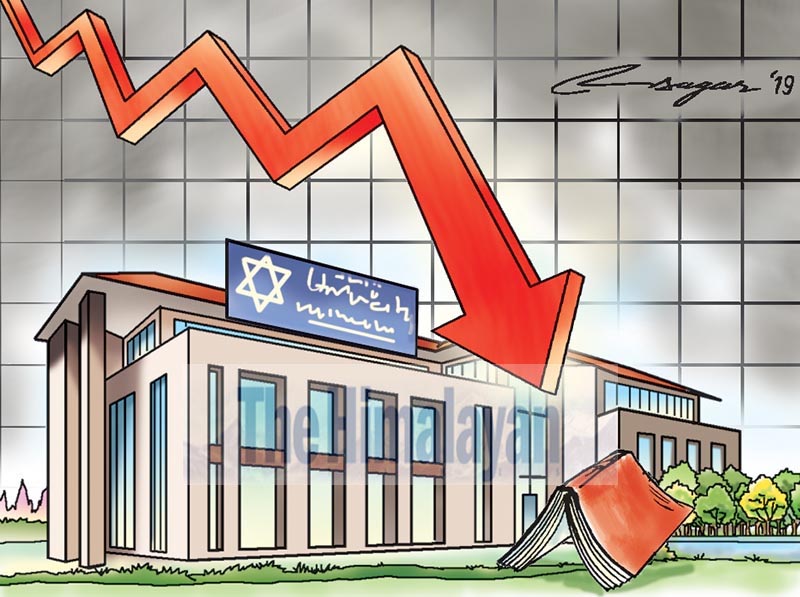Erosion of academic standards: A decline of ethics
There are several ways by which ethics can be injected in the people. The most effective one is its pursuance by those who run the country, and they are the politicians. But Transparency International has labelled the political parties as the most corrupt institution in the country
Never before in the history of Nepal had the academic standard of the universities taken such a steep nosedive as in the present. Its academic showpiece outside the country, the Tribhuvan University, has been in the news, but for dubious reasons, the mention of which will make anybody’s head hang in shame. The TU Service Commission has been alleged to have passed the failed candidates. Yet another failed student bribed the Examination Division officials and got the gold medal. There is no dearth of people of high integrity in the university, but a corrupt few have tarnished the image of all like a spoilt fish making the whole pond smelly.
A university in Nepal was like a snake in Iceland till the year 1956, when the first university, Tribhuvan University, was established following a report of the National Education Planning Commission constituted in the year 1954. It remained a solitary reaper till the year 1986, when then the Mahendra Sanskrit University, now the Nepal Sanskrit University, appeared on the scene. Even today, it bears the brunt of the academic load by providing education to 80 per cent of the college level students despite having 14 peers in the country.
Tribhuvan University, a synonym of higher education in Nepal, had maintained its image fairly till the pre-Republican era in Nepal. It began going downhill so rapidly afterwards that it has almost hit rock bottom at the present. Like a silver lining in a dark cloud, what is, however, encouraging is that it is likely to come out of this morass as there is no room for further decline now.
This is, however, not a phenomenon exclusive to Nepal alone. The falling standards in the universities have raised their ugly heads not only in the developing but also in the developed world. Accordingly, British universities are also said to have experienced a downward slide after its Prime Minister Tony Blair back in the year 1999 targeted 50 per cent of adult participation in higher education in the new century. Academic standards then began to dwindle after they were lowered to admit people of deprived backgrounds, according to the Association of Graduate Recruiters.
There are others like Geoffrey Alderman, British academic advisor, who disagree to the association’s view. He attributes it to the award of degrees to undeserving students following pressure on the academic staff from the senior leadership, in what is known as the League Table Culture. The admission of full fee students leading to the award of a degree even if they are not up to the mark, students’ evaluation thereby leading the tutors to allocate higher grades to mediocre students for the sake of promotion, abandonment of the external examination system on the pretext of unavailability of budget, and viewing plagiarism from the lens of cultural relativism are a few of the stumbling blocks on the way of good academia to Alderman.
Cambridge and Oxford University continue to top the university ranking list every year, but they appear as islands of excellence amidst an ocean of mediocrity. In the developing far off Nigeria also, the university standards have suffered, for which the degrading ethical standards have been held responsible in the name of modernity and academic freedom.
Nepal has fallen victim to both these problems - league table culture as in the case of Britain and the loss of ethical standard as in the case of Nigeria. Nepal is also seeking to raise the higher education enrollment to 45 per cent by 2030. Moreover, undeserving candidates are getting admission in the courses as full fee paying students.
But the most prominent factor is the falling ethical standard. Ethics provides an indication of what is right and what is wrong. In the absence of proper ethical behaviour, people in Nepal favour the familial closeness instead of merit. This has led to the irregularity seen in the TU Service Commission. Because of ethical insensitivity, a person wanted to get a gold medal even after failing. Because of ethical unawareness, officials of the Examination Section accepted the bribe and did something undoable.
There are several ways by which ethics can be injected in the people. The most effective one is its pursuance by those who run the country, and they are the politicians. But Transparency International has labelled the political parties as the most corrupt institution in the country. The country has to find ways and means by which the political machinery can be cleansed. State financing of the national parties could be one of the ways out of this impasse.
A shadow government can make the opposition more accountable. The provision of adequate numbers of social packages will make the bureaucracy less corrupt. The two-thirds majority government, which the country has received after so long, should carry out such far reaching reforms.
Unfortunately, it has lost its way by seeking to curb press and academic freedom, disturbing the age-old Trust (Guthi) system, barring the vice-chancellor of a university from attending a conference outside the country and wasting time in several other sundries like these.






